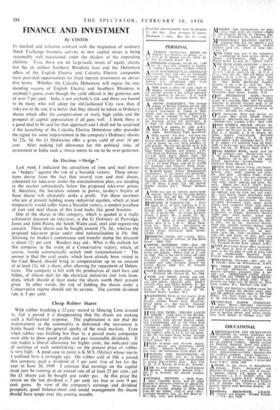FINANCE AND INVESTMENT
By CUSTOS IN marked and welcome contrast with the stagnation of ordinary Stock Exchange business, activity in new capital issues is being reasonably well maintained under the shadow of the impending election. True, there are no large-scale issues of equity shares, but the £6 million Southern Rhodesia loan and the Debenture offers of the English Electric and Calcutta Electric companies have provided opportunities for fixed interest investment on attrac- tive terms. Whether the Calcutta Debenture will repeat the out- standing success of English Electric and Southern Rhodesia is anybody's guess, even though the yield offered is the generous one of over 5 per cent. India is not anybody's risk and there are bound to be many who will adopt the old-fashioned City view that, if risks are to be run, it is better that they should be taken in Ordinary shares which offer the compensation of really high yields and the prospect of capital appreciation if all goes well. I think there is a good deal to be said for that approach and I shall not be surprised if the launching of the Calcutta Electric Debenture offer provides the signal for some improvement in the company's Ordinary shares. At 22s. 3d. the £1 Ordinaries offer a gross yield of over 10 per cent. After making full allowance for the political risks of investment in India such a return seems to me to be over-generous.
An Election t, Hedge"
Last week I indicated the attractions of iron and steel shares as " hedges " against the risk of a Socialist victory. These attrac- tions derive from the fact that several iron and steel shares, scheduled for take-over under the nationalisation plan, are standing in the market substantially below the proposed take-over prices. If, therefore, the Socialists remain in power, to-day's buyers of these shares will ultimately make a profit. For those investors who are at present holding many industrial equities, which at least temporarily would suffer from a Socialist victory, a modest purchase of iron and steel shares of this kind looks like good business.
One of the shares in this category, which is quoted at a really substantial discount on take-over, is the £1 Ordinary of Partridge, Jones and John Paton, the South Wales coal, steel and engineering concern. These shares can be bought around 17s. 3d., whereas the proposed take-over price under steel nationalisation is 19s. 10d. Allowing for broker's commission and transfer stamp the discount is about 12+ per cent Readers may ask : What is the outlook for this company in the event of a Conservative victory, which, of course, would automatically scotch steel nationalisation ? The answer is that .the coal assets, which have already been vested in the Coal Board, should bring in compensation up to an amount of at least 12s. 6d. a share, after allowing for repayment of Deben- tures. The company is left with the. production of steel bars and billets, of silicon steel for the electrical industries and iron foun- dries, which should at least make the shares worth their present price. In other words, the risk of holding the shares under a Conservative regime should not be serious. The current dividend rate is 5 per cent.
Cheap Rubber Shares
With rubber breaking a 22-year record in Mincing Lane around ls. 3id. a pound it is disappointing that the shares are making such a half-hearted response. The explanation is not that the improvement in the commodity is distrusted-the movement is firmly based-but the general apathy of the stock markets. Even when rubber was fetching less than Is. a pound many companies were able to show good profits and pay reasonable dividends. If one makes a liberal allowance for higher costs, the indicated rate of earnings of such undertaking; on the present price of rubber is very high. A good case in point is K.M.S. (Malay) whose merits I outlined here a fortnight ago. On rubber sold at 10d. a pound this company paid a dividend of 5 per cent. free of tax for the year to June 30, 1949 1 estimate that earnings on the capital must now be running at an annual rate of at least 25 per cent., yet the £1 shares can be 'bought just under par. At this price the return on the last dividend is 5 per cent. tax free or over 9 per cent. gross. In view of the company's earnings and dividend prospects,•good balance-sheet and sound management the shares should have scope over the coming months.


































 Previous page
Previous page